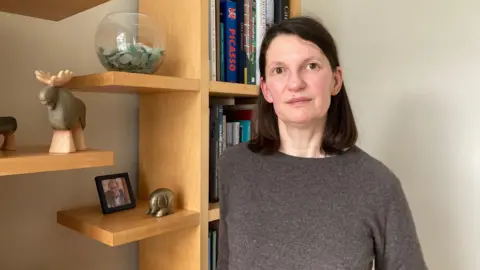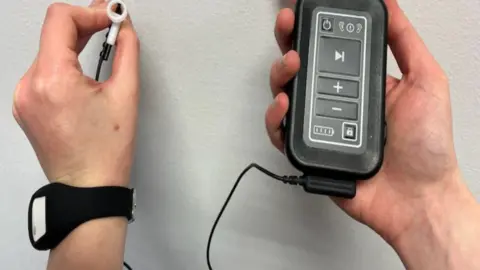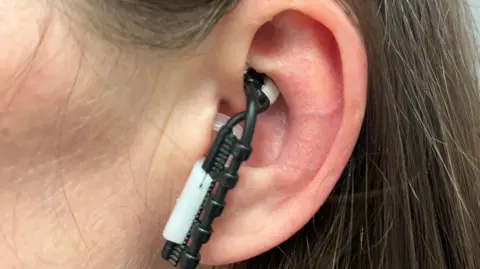'I was determined to walk again after having a stroke'
 BBC/Victoria Scheer
BBC/Victoria ScheerWhen Helen Shelton suffered a stroke nearly five years ago, doctors told her husband she might die.
Helen, then aged 51, had woken up in the middle of the night on 28 January 2020 "feeling boiling hot and thirsty".
When she tried to speak, she noticed her speech had become slurred and her face had drooped.
"I couldn't feel my left arm or leg," she recalls. "It was a very severe stroke."
According to researchers at The University of Sheffield, about 110,000 people in the UK suffer a stroke each year, and it is currently running a medical trial aimed at helping at least some of them in their recovery.
'Overwhelming fatigue'
While strokes and their effects vary, for people like Helen, the condition can be life-changing.
"I couldn't walk. I couldn't use my left arm. I was in a wheelchair for quite some time," says Helen, who lives in Sheffield.
"It affected my emotions, my concentration - the fatigue was overwhelming."
Carrying out daily tasks such as getting dressed, showering or going to the bathroom unaccompanied seemed near-impossible at the start.
"People were telling me it was going to be really difficult and hard," she says.
"I said, 'I don't care. I can do difficult, I can do long. It doesn't matter. If it takes 10 years, it takes 10 years. I've got time, just tell me how'."
 The University of Sheffield
The University of SheffieldFor Helen, part of her determination to regain her mobility stemmed from her wish to return to her full-time job as an academic director at the English Language Teaching Centre at The University of Sheffield.
However, she says her health improvements were neither instantaneous nor easy, and required daily exercise, regular physiotherapy and dietary changes.
"The key to stroke recovery is to keep going," she explains.
"It's not linear. There are good days and there are bad days."
Helen says she approaches her recovery in steps, setting small goals such as brushing her hair with both arms or holding a toothbrush while putting toothpaste on it.
Over the last five years, she says she has gone from "lying absolutely immobile in a hospital bed" to returning to work, taking regular walks in the Peak District and even going on a work trip to Japan.
'Important target'
Meanwhile, since November, she has also participated in the medical trial led by the University of Sheffield and Sheffield Teaching Hospitals NHS Foundation Trust which aims to help patients who suffer from arm weakness as a result of a stroke.
About a third of stroke survivors are left with permanent arm weakness, limiting their ability to carry out everyday activities.
Up to 243 patients from 15 UK stroke centres are set to be enrolled into the trial over the next two years.
As part of the trial, Helen now wears a portable pacemaker-like device which delivers electrical pulses to damaged areas of the brain via a connected earpiece.
Dr Ali Ali, consultant physician in geriatrics and stroke at Sheffield Teaching Hospitals, says the non-invasive treatment stimulates the vagus nerve, which runs from the brain through the neck to the abdomen, and has many functions throughout the body.
"We think the vagus nerve could be quite an important target to try and help accelerate people's rehabilitation following neurological injury such as those that are experienced when someone has a major stroke," Dr Ali says.
The trial, while in its infancy, has already received positive feedback from patients, but will need more participants to be conclusive, he adds.
 Helen Shelton
Helen SheltonWhile Helen says it is still too early to tell, she believes the device being trialled helps her focus on using her arm.
"It's fabulous and I feel very fortunate to be part of the experiment," she says.
"But I do think what really makes a difference is dedication to your exercises," she says.
"Hopefully [it will] bring back some function.
"Ideally, I'd love to tie my own shoelaces at some point."
Listen to highlights from South Yorkshire on BBC Sounds, catch up with the latest episode of Look North or tell us a story you think we should be covering here.
